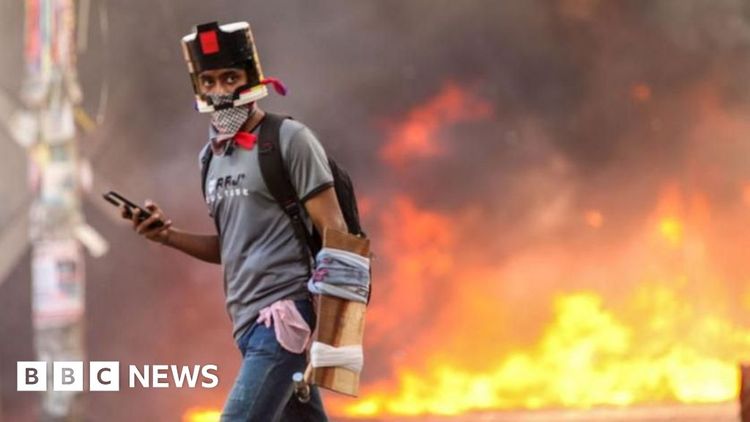Sheikh Hasina: Bangladesh's protesters want their PM to go. Can ...

“One, two, three, four, Sheikh Hasina is a dictator!"
The chant has become increasingly popular in Bangladesh among young protesters who have one demand - they want their prime minister to step down.
Hearing those words on the streets just a month ago would have been unthinkable - the 76-year-old Ms Hasina has ruled the South Asian nation of 170 million with an iron fist since 2009.
But she is facing a deadly stalemate. There is an indefinite curfew across Bangladesh and fears of more violence as protesters - in their hundreds of thousands, by some estimates - prepare for a march in the capital Dhaka.
Will the protests - some of the biggest the country has ever seen - unseat Sheikh Hasina?
She herself has been defiant, condemning the agitators as “terrorists”. Law minister Anisul Huq told the BBC calls for her resignation are "unjustified" and the protesters were reacting "emotionally".
Ms Hasina had offered to sit down and talk to the protest leaders, but they rejected the offer. Her defiance is a clear indication that she’s not willing to step down without a fight, and some worry that could lead to more bloodshed.
Bangladesh blocks internet as more protests expected: Follow live
The daughter of Bangladesh's founding president, Sheikh Hasina is the world’s longest-serving female head of government.
Her 15 years in power have been rife with accusations of forced disappearances, extra-judicial killings, and the crushing of opposition figures and her critics - she denies the charges, and her government often accuses the main opposition parties of fuelling protests.
In recent weeks too, Ms Hasina and her party - the Awami League - have blamed their political opponents for the unrest that has gripped the country.
But this time, the anger feels louder than ever before. Estimates say the protesters are in the tens of thousands, and the numbers now include Bangladeshis of all stripes, not just students. This is certainly the most serious challenge Ms Hasina has faced since taking office after a contentious election win in January.
Ms Hasina has scrapped the job quotas that sparked the protests in early July. But the student-led agitation continued, morphing into an anti-government movement that wants her out of power.
A brutal crackdown by security forces has only put her in a tougher position. At least 90 people, including 13 police officers, were killed on Sunday - the worst single-day casualty in protests in Bangladesh’s recent history. Critics are calling it a “carnage”.
Ms Hasina is not prepared to resign, says Professor Samina Luthfa from Dhaka University: "She thinks everything is under control. However, nothing is under her control anymore."
But how long can she hold on?
Ms Hasina already had to rely on the military when protesters ransacked police stations and set fire to government buildings last month.
The army was deployed after police and paramilitary forces failed to contain the unrest. But Friday saw fresh protests, which did not abate over the weekend.
If Ms Hasina wants to survive, she needs the support of the military, which still commands respect among people.
Some ex-military personell have expressed support for the protests and the army has been cautious in its response. The military chief, General Waker-Uz-Zaman, met junior officers on Friday amid concerns over how the army might repsond to the protests.
“[The] Bangladesh army will perform its promised duty in line with Bangladesh's constitution and existing laws of the country,” the spokesperson for the armed forces said on Sunday.
Meanwhile, Bangladesh’s neighbour and biggest ally, India, is likely to continue backing Ms Hasina. For one, she has clamped down on anti-India militant groups based in Bangladesh.
Two, Delhi has always viewed its foothold in Bangladesh as key to the security of the seven landlocked states in India's north-east, all of which share a border with Bangladesh - and Ms Hasina has given transit rights to India to make sure goods from its mainland make it to those states.
There’s also strong sentiment against India within Bangladesh, partly because of Delhi’s support for Ms Hasina.
“If India decides [to] let things happen in Bangladesh and [that] they will not interfere, then Ms Hasina will not be able to sustain [her role]," says Mohiuddin Ahmed, a Bangladeshi political historian. "I think her days are numbered.”
But it's not immeditaely clear if and how the protests will change Delhi's calculations.
Ms Hasina has already been facing huge critcism at home and abroad - the main opposition Bangladesh Nationalist Party (BNP) and its allies say the last three elections have not been free and fair, which Ms Hasina's Awami League has denied.
The opposition even boycotted the 2024 polls, saying they would only take part if voting was overseen by an interim, neutral administration.
What Ms Hasina faces this time though is not just a challenge from her political opponents. The student-led protest movement has drawn people from all walks of life, including the opposition and Islamist parties.
More people are joining the protests knowing that nearly 300 have been killed in recent weeks - many of them shot by the police.
If protesters are indeed undeterred by the prospect of violence, that doesn’t augur well for any government, least of all an embattled one.







































































